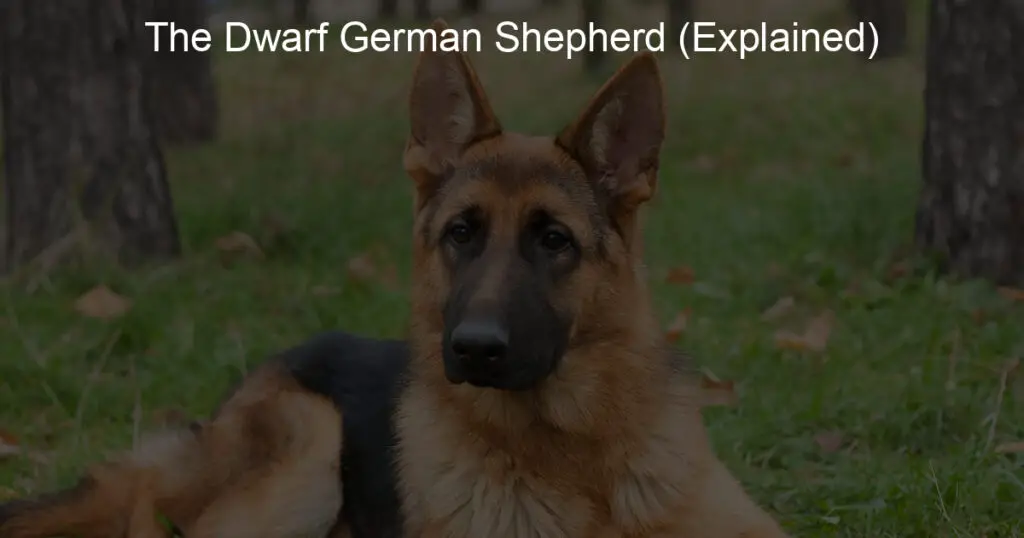Do you want to know more about this cute and pint-sized version of the beloved German Shepherd? Have you heard of the Dwarf German Shepherd, but aren’t sure what makes it different from the standard breed? If you answered “yes” to either of those questions, then this post is for you!
Is there such a thing as a dwarf German Shepherd?
Believe it or not, some people are trying to breed dwarf German Shepherds. While the “dwarfs” may look like your average German Shepherds from a distance, they’re just smaller in size.
Like other breeds, they come with the same loyal and intelligent characteristics as their full-sized counterparts. However, these dogs come from an intentional cross-breeding of two breeds with different backgrounds.
It is important to be informed about potential health risks that could arise in these dogs. Additionally, as cute and pint-sized as dwarf German Shepherds might appear, it’s important to remember that they can still require the same level of obedience training and exercise as regular German Shepherds.
Who is the famous dwarf German Shepherd?
The most recognizable and famous dwarf German Shepherd is undoubtedly the canine star from the well-known Disney movie series, Goofy. Despite his comical nature and rather dopey characteristics, he is an excellent example of what a normal dwarf German Shepherd would look like.
With his small stature, floppy ears, and characteristic smirk, this little guy has just captured hearts all over the world since his debut in 1932 with the release of ‘Mickey’s Revue’. For years this character has been an emblem of family fun, loyalty, and true companionship – qualities that define every dwarf German Shepherd.
How big do dwarf German Shepherds get?
Dwarf German Shepherds, while they sound like pint-sized versions of their larger cousins, are still a good size. These canines are usually between 16 – 22 inches tall and weigh between 17 – 38 lbs when fully grown.
Therefore, the size of a full-grown Dwarf German Shepherd can be similar to that of a full-sized German Shepherd puppy before it gets to maturity! However, these Shepherds tend to keep a more petite frame even as adults because they do not grow at the same rate as their larger relatives.
While small in stature, these dogs still bring all the intelligence and loyalty that is present with bigger German Shepherds. So if you’re looking for a loyal companion but don’t think you have room for a giant pooch, a Dwarf German Shepherd might be the perfect canine companion for you!
What are the signs of dwarfism in German Shepherds?
German Shepherds are powerful and majestic dogs who can be seen everywhere from the movie screen to the farm. While they are often known for their strength, some of the canine canines may have dwarfism.
Signs of dwarfism in German Shepherds are not always visually evident; however, some physical symptoms that owners can look out for include short legs, bulging eyes, and a large head with a neat muzzle. Owners may also note behavior like increased clumsiness or difficulty rising upstairs.
In addition, Dwarfism can lead to orthopedic issues like skeletal abnormalities and hip and elbow dysplasia. If you suspect your pup has dwarfism, it’s important to get them examined by a licensed vet right away and discuss potential treatments– it’s the best way to ensure your pal lives their happiest and healthiest life!
How long do dwarf German Shepherds live?
Dwarf German Shepherds, or ‘Miniature’ German Shepherds, have become increasingly popular among dog owners in recent years. Not only do these lively, pint-sized pups have the same endearing personality traits as their full-size counterparts, but they also benefit from a much longer life span!
With proper nutrition and regular veterinary care, many dwarf German Shepherds live to be up to 15 years old – an incredibly long life for a small breed of dog. Their small size makes them the perfect pet for anyone who loves the classic German Shepherd look and temperament but doesn’t have the space or resources to accommodate a larger breed.
Can German Shepherds survive dwarfism?
Many owners of German Shepherds are concerned that the breed might have a genetic predisposition to dwarfism, but thankfully this isn’t true! Though German Shepherds can have many different hereditary health issues, such as hip dysplasia and epilepsy, dwarfism is not one of them.
Generally speaking, as long as care is taken to ensure that a German Shepherd puppy comes from a reputable source and has its necessary health screenings done early in life, the probability of it developing dwarfism (or any other serious health issue) is greatly reduced.
Conclusion
To sum it all up, the Dwarf German Shepherd is a unique breed of small and energetic shepherds that make a great companion for any family. Whether you want to take them on hikes or just play in the backyard, these little dogs offer a lot of fun and joy. They also need plenty of exercise like any other pet, so it’s important to manage your time accordingly if you do decide to bring one into your home. The Dwarf German Shepherd is more than just a cute face; they are loyal, loving, and devoted guardians with amazing personalities. If you’re looking for an adorable yet hardworking canine companion, this breed may be perfect for you!















